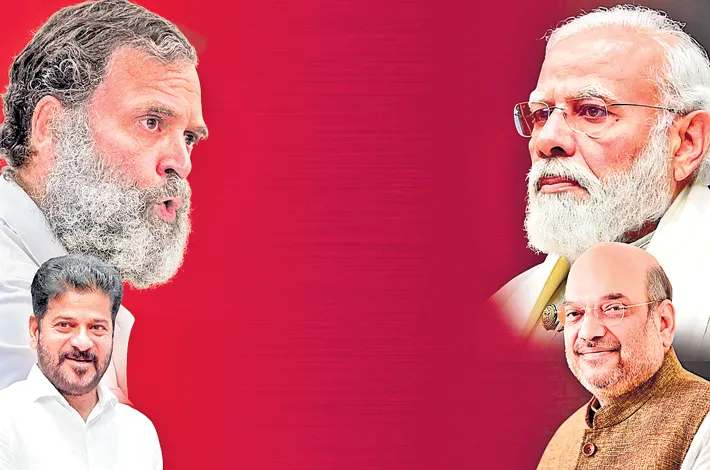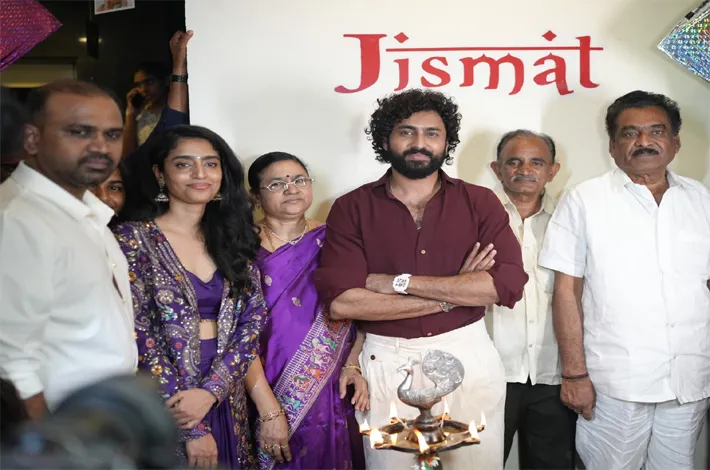Congress Finds New Ammunition in Revanth Reddy’s BC Reservation
25-07-2025 12:00:00 AM

THE FIGHT IS ON!
- Push to Challenge Modi-Shah’s NDA Dominance
- Revanth Reddy’s ascent as a political force has injected fresh vigour into a demoralized Congress
- At the heart of Revanth’s strategy is the issue of BC reservations, a masterstroke that could redefine Congress’s electoral fortunes
- Revanth’s success lies in his ability to blend policy with politics
For over a decade, the Indian National Congress has stumbled in its attempts to counter the formidable electoral machine of Narendra Modi and Amit Shah’s National Democratic Alliance (NDA). Since 2014, the Congress has been out-maneuvered at every turn, unable to dent the BJP’s potent blend of Hindutva ideology, Modi’s carefully crafted larger-than-life image, and a polarizing Hindu-Muslim narrative that has swayed a significant chunk of India’s Hindu majority. Add to this the NDA’s strategic moves—such as the Women’s Reservation Bill, the delimitation agenda, and an iron grip over the election machinery—and the Congress has been left scrambling for relevance. However, a new spark has emerged from an unlikely corner: Telangana Chief Minister A. Revanth Reddy. His bold push for Backward Classes (BC) reservations and his unapologetic confrontation of the NDA’s tactics could be the ammunition Congress desperately needs to stage a comeback. With Rahul Gandhi and AICC chief Mallikarjun Kharge rally behind him, the party is poised to take the fight to Modi and Shah like never before.
Revanth Reddy’s ascent as a political force has injected fresh vigour into a demoralized Congress. His stunning victory in the 2023 Telangana Assembly elections, where he led the Congress to a decisive triumph over the seemingly invincible Bharat Rashtra Samithi (BRS) and its supremo K. Chandrasekhar Rao, shattered the myth of regional invincibility. Defying the odds, Revanth’s campaign dismantled the BRS’s decade-long dominance, proving that strategic focus and grassroots mobilization could upend even the most entrenched political dynasties. His triumph was not just a state-level win; it was a signal to the Congress high command that a new playbook was possible—one that could challenge the NDA’s national hegemony.
At the heart of Revanth’s strategy is the issue of BC reservations, a masterstroke that could redefine Congress’s electoral fortunes. On July 24, 2025, Revanth presented a detailed roadmap to Rahul Gandhi and Mallikarjun Kharge in New Delhi, outlining Telangana’s plan to implement a 42% BC reservation quota in local body polls, education, and employment. This move, which he described as a “historic step” toward social justice, is not just a policy decision but a calculated political gambit. By championing the cause of Backward Classes—who, along with Scheduled Castes (SCs), Scheduled Tribes (STs), and minorities, constitute nearly 90% of Telangana’s population—Revanth has positioned Congress as the defender of marginalized communities, directly challenging the BJP’s narrative of Hindu unity under its Hindutva umbrella.
The BJP, led by Modi and Shah, has long opposed enhanced reservations, particularly for BCs and economically backward Muslims, viewing them as a threat to its vision of a monolithic Hindu identity. Revanth has seized on this, accusing the BJP of using the pretext of “Muslim reservation” to block Telangana’s 42% BC quota bills. He pointedly noted that BJP-ruled states like Gujarat, Uttar Pradesh, and Maharashtra have long provided reservations to economically backward Muslims, exposing the party’s hypocrisy. This contradiction is a chink in the BJP’s armour that Congress is now eager to exploit. Revanth’s presentation to Congress leaders emphasized taking the BC reservation issue national, framing it as a fight for social equity against the RSS’s anti-reservation ideology.
But Revanth’s offensive doesn’t stop at reservations. The Congress, under Rahul Gandhi’s leadership, is sharpening its attack on the Election Commission of India (ECI), accusing it of enabling manipulations in recent polls, particularly in Maharashtra and Karnataka. Rahul Gandhi has claimed that the ECI, along with other institutions like the CBI, ED, and bureaucracy, is under the BJP’s thumb, undermining the democratic process.
These allegations are not mere rhetoric; they are backed by concerns raised during the Congress Working Committee (CWC) meeting on November 30, 2024, where Mallikarjun Kharge flagged Electronic Voting Machines (EVMs) as making the electoral process “suspect.” The Congress’s defeat in Maharashtra, where the Maha Vikas Aghadi (MVA) was decimated despite a favorable public mood, and its loss in Haryana have fueled suspicions of foul play. By spotlighting these issues, Congress aims to rally public discontent over electoral integrity, positioning itself as the guardian of democratic values.
This dual strategy—BC reservations and exposing alleged electoral manipulations—marks a significant departure from Congress’s earlier, often tepid, responses to the NDA’s dominance. In the past, the party struggled to counter the BJP’s Hindutva narrative, which has effectively consolidated Hindu voters by stoking fears of a “Muslim threat.” The Women’s Reservation Bill, passed in 2023 but tied to the next census and delimitation, has been criticized as a BJP ploy to delay actual implementation while reaping electoral dividends. Similarly, the delimitation agenda, which could reduce southern states’ parliamentary representation due to population-based seat allocation, has deepened perceptions of a North-South divide. Congress’s failure to challenge these moves head-on has cost it dearly, but Revanth’s aggressive approach signals a shift toward a more confrontational stance.
Revanth’s success lies in his ability to blend policy with politics. The Telangana caste census, completed under his leadership, is being touted as a model for the nation. Rahul Gandhi has vowed to replicate it nationwide, promising to remove the 50% cap on reservations to ensure proportionate representation for Dalits, Adivasis, and OBCs. This commitment directly challenges the BJP’s alleged agenda to scrap reservations by 2025, the RSS’s centenary year. Revanth’s accusation that the BJP deliberately delayed the 2021 Census to undermine reservation policies adds another layer to this narrative, painting the NDA as anti-social justice.
The Congress is also learning from its past mistakes. The party’s earlier attempts to counter Modi’s charisma—such as the “chowkidar chor hai” slogan—backfired, alienating voters. This time, under Kharge’s call for unity and discipline, the Congress is focusing on issues that resonate with the masses: economic inequality, unemployment, and caste-based discrimination. Revanth’s campaign in Telangana, with slogans like “marpu kavali” (we want change) and his success in sidelining the BJP’s Ayodhya Ram temple narrative, demonstrates that a focused, issue-based approach can neutralize Hindutva’s emotional pull.
The road ahead is fraught with challenges. The BJP’s organizational strength, backed by the RSS and vast financial resources, remains formidable. The NDA’s welfare schemes, like Maharashtra’s Mukhyamantri Majhi Ladki Bahin Yojana, have proven effective in countering opposition narratives. Moreover, the BJP’s ability to control the narrative through media and institutions gives it a significant edge. Yet, Revanth Reddy’s audacious leadership has given Congress a fighting chance. By making BC reservations and electoral integrity the cornerstones of its revival strategy, the party is finally crafting a counter-narrative that could resonate across India’s diverse.
The game is indeed on. Revanth Reddy has handed Congress a potent weapon to challenge Modi and Shah’s juggernaut. Whether this momentum translates into electoral success depends on Congress’s ability to stay united, sharpen its messaging, and mobilize the marginalized communities it claims to represent. For now, Revanth’s bold moves have set the stage for a battle that could redefine India’s political landscape. The fight has begun, and Congress is no longer content to play catch-up.
Rahul to Revanth: Turn Caste Census into Change
At a high-level meeting with MPs and leaders, including Kharge, Priyanka Gandhi, CM Revanth Reddy, and Deputy CM Vikramarka, Rahul Gandhi praised Revanth Reddy for conducting a comprehensive caste census in Telangana, emphasizing the need for implementation.
"Revanth ji’s task is to turn data into tangible benefits for Telangana. Our role is to push for BC reservation bills in the Ninth Schedule and break the 50% reservation cap," Rahul stated. He vowed that Congress will fight for justice for OBCs, Dalits, Adivasis, and marginalized groups nationwide.
Rahul acknowledged Congress’s past shortcomings in addressing OBC issues, noting that BJP capitalized on this gap with hollow promises. He called for greater responsibility among leaders and highlighted Telangana’s caste census as a "power tool" driven by precise, street-level data for targeted development.
He pointed out the importance of English education as a key success factor in Telangana, criticizing BJP leaders for supporting English privately but opposing it publicly. He urged equitable access for all, especially OBCs, Adivasis, and women.
Rahul praised Telangana’s efforts as a national benchmark and called for this movement to inspire broader change.
Revanth Reddy described the caste census as a "societal health check-up" and accused the BJP-led Centre of blocking Telangana’s 42% BC reservation efforts despite passing bills. He urged MPs to pressure Parliament and announced a protest at Jantar Mantar. He criticized KCR and BRS for not supporting the census and attacked Prime Minister Modi, calling him a "converted OBC" who has failed backward communities. He blamed BJP and RSS resistance nationwide.
Vikramarka outlined the process, noting the involvement of over 2 lakh personnel, digital tools, and 56 questions to capture socio-economic details accurately.
Earlier, Telangana Congress leaders briefed Kharge and Rahul about bills passed in the state and demanded inclusion of the BC quota bill in the Ninth Schedule to safeguard it. Mahesh Kumar Goud warned against Centre stalls and accused BJP of double standards, criticizing BRS’s past dilution of BC representation.








